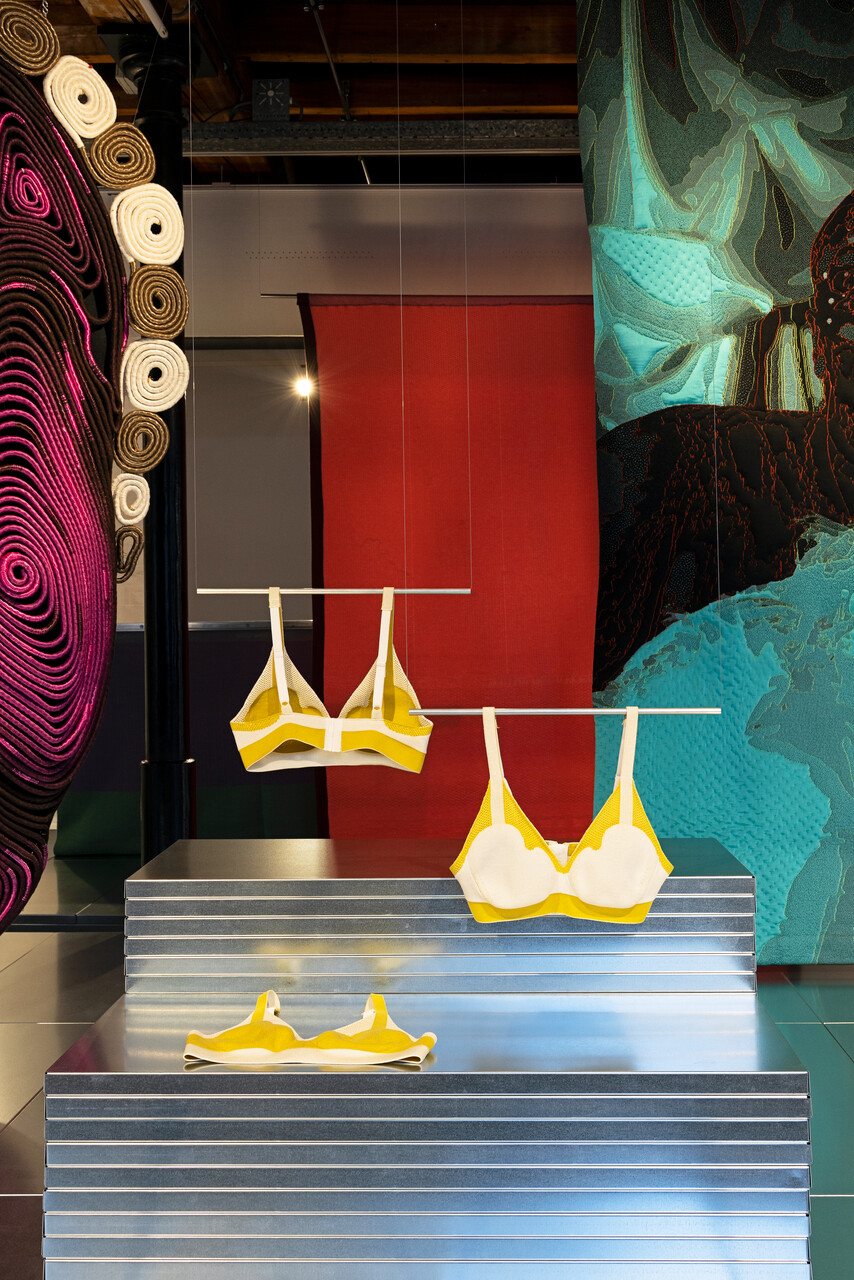Makers in the TextielLab are not limited to a standard range of yarns. On request, yarn advisor Vera de Pont searches the market for materials that can take a project to the next level. These are increasingly natural, recyclable or recycled.
From a very hairy yarn that won’t clog the machine and a gold, fire-retardant thread for a royal palace, to recycled Trevira in a muted pastel rather than a standard neon shade: these are just some of the requests from makers and product developers that yarn adviser Vera de Pont presents to suppliers in the Netherlands and abroad. At trade fairs such as Pitti Immagine Filati in Florence and Techtextil in Frankfurt, she goes through stacks of sample books, looking for innovative yarns that the lab doesn’t have to buy in bulk quantities of 300 kilos or more; the unique productions in Tilburg often require no more than 10 kilos. From the intake interviews she conducts with makers in the lab, it is clear that sustainability is a hot topic. More and more makers want to work with recycled yarns. “I saw the same trend at the trade fairs,” De Pont says. “All suppliers now have an eco-offering, which was a pleasant surprise. These are often still mixed yarns, which is a pity because they are more difficult to recycle. The yarns also behave in less predictable ways.”
Tencel-knitted bra
For Studio Melonit, De Pont went in search of a knittable, 100% lyocell yarn. The designers wanted to make their seamless knitted bra from Tencel, which is the brand name for lyocell, a sustainable cellulose fibre made of eucalyptus wood. “Lyocell is produced in a closed-loop system, in which everything is recycled,” explains De Pont. “Eucalyptus grows quickly, requires little water and produces a breathable, anti-bacterial yarn. But the yarn we had in the lab was mainly used for weaving, and it didn’t work well on the knitting machine. We tested a twisted and coiled 100% lyocell yarn, but the extra twists made the yarn harder which didn’t feel nice against the skin.” In discussion with the product developer, and after much sampling, they selected a yarn made of 90% recycled lyocell with 10% polyester providing the desired elasticity. The same yarn was recently used in the lab by Design Academy Eindhoven student Kristiyan Hristov, who knitted modular, degradable shoe parts for an ‘extreme fast fashion’ project. “Our challenge for the coming year is to eliminate that final 10%,” says De Pont.

The knitted bra by Melonit. Photo: Josefina Eikenaar
“I’d like to source 100% recycled wool.”
Yarns for 3D constructions
Another emerging trend is the increased demand for yarn to weave and knit 3D shapes – self-supporting or form-retaining spatial constructions. “This requires a yarn that is both stiff and lightweight,” she says. “We often use a monofilament warp on one of the jacquard looms for this. Monofilament also has the added benefit of being fire retardant, which is a prerequisite for all textile objects in public buildings. Fransje Gimbrère used it to weave ‘Linum’, a transparent dividing wall for Tilburg’s town hall, while Anna Bruun incorporates it in her ‘Woven Walls’, multi-layered and self-supporting woven tunnels. In addition, Sangmin Oh used monofilament for his ‘Knitted Lights’, floor lamps with coral-like characteristics. In the meantime, De Pont continues to look for alternatives to the stiff polyester. “One option is thermoset plastics that can be melted without the yarn shrinking, but I prefer a more sustainable solution. And there may be a paper yarn out there that is stiff enough for us to use.” Also on De Pont’s to-do list this year is finding a recycled replacement for the Trevira CS warp on the jacquard loom.
New range for the circular knitting machine
More good news for makers is that the lab will offer an updated and expanded range of yarns for the new circular knitting machine. These can be ordered for each project. The gauge on the new machine is different from the old one. As the range of yarns is being refreshed anyway, the lab is taking steps to improve sustainability here too. “I’d really like to source 100% recycled wool, and I’m looking for a supplier who can supply it in small quantities. It would also be great if we could find a way to use the 15 cones of conductive yarn I have in stock; energy continues to be a hot topic.”